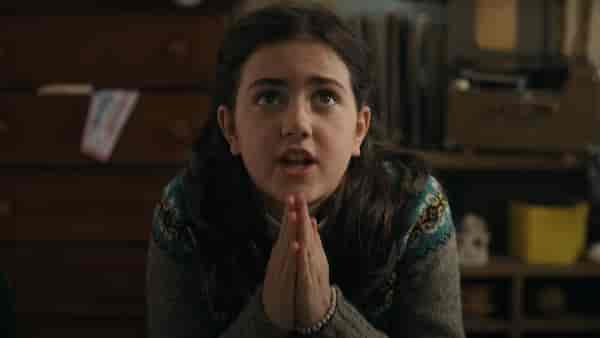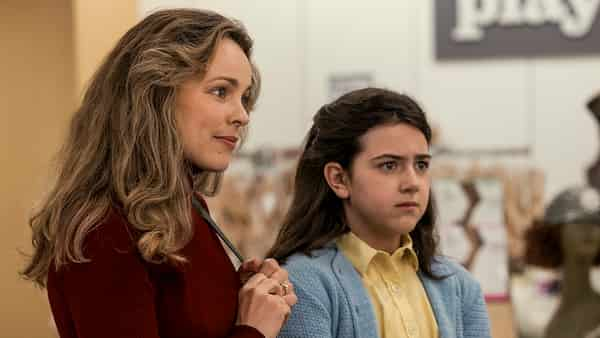Are You There God? It’s Me Margaret: A Lovely Ode To The Religion Of Living
This is #CineFile, where our critic Rahul Desai goes beyond the obvious takes, to dissect movies and shows that are in the news.

Last Updated: 04.19 PM, Sep 01, 2023
YOU know how good books make you imagine the story in moving images? You read a paragraph and your mind immediately allocates a sense of memory, place and time to it. Kelly Fremon Craig’s Are You There God? It’s Me, Margaret is conversely true — it’s a film that makes you imagine the words of the book it’s based on. You watch a moment and your mind starts to allot a sense of literature to it. I haven’t read Judy Blume’s seminal 1970 novel, but the tranquil middle-school movie unfolds in the language of both text and subtext. It captures girlhood through the lens of change, without compromising on the inevitability of it all. The coming-of-age-ness is almost spare, like something that’s written rather than seen. Most of all, it reveals the teething relationship between fate and faith. The title refers to the pleas of an 11-year-old for whom ‘God’ is merely a distant cousin of Santa Claus. Prayer is an adolescent wishlist, not (yet) an ode to religion.
The feel-good drama is set in 1970, and stars a pitch-perfect Abby Ryder Fortson as Margaret Simon, a pre-teen girl who reluctantly moves from the big city (New York) to the airy suburbs (New Jersey) after her father’s promotion. The anti-story unfolds over a year in this new setting, even as she struggles to leave her old self behind. It’s also a year of firsts — first crush, first kiss, first period, first bra, first big lie — in the life of a girl who’s almost too real for the concept of American suburbia. She misses her grandmother (Kathy Bates) back in the city. And once her new teacher notices that she dislikes ‘religious holidays,’ her status as the daughter of liberal parents (a Catholic mother and Jewish father) — both of whom refuse to enforce an identity onto her (“Sometimes I wish I was just born one way”) — comes into focus. She tries the temple as well as the church, but remains unsure about where she can find God except her bedroom, when she’s alone.

In some sense, Margaret is the live-action protagonist of Pixar’s Inside Out, the deeply perceptive animated comedy about the inner workings of a child’s homesick mind during a family move. Here, we see the ‘Out’ version. Her turmoil is expressed through her requests to God: Can you stop the New Jersey move? Can you give my bra something to hold? Can I please have my first period before the others? Can you help my mom reconnect with her estranged parents? Can you help me choose a religion? None of her pleas are ever answered, a nice reminder of how faith is actually just therapy to deal with the autonomy of life.
Margaret forges a relationship with the idea of God because she is intimidated by the newness of her year. She probably knows it doesn’t work that way, but by the end she also seems to sense that it’s not supposed to work any way. She will grow, she will be sad and happy, she will drift, she will love and lose, she will bleed and heal, irrespective of what she asks for. Life will go on, and whether she wants to attribute these milestones of evolution to divinity or a teen diary will ultimately define her. She’s religious by virtue of being human. She will perhaps look back on this year as an adult more than other years. See what I mean about the film’s literary nature?

While I like that the film fleshes out some of the adults — the mother Barbara (Rachel McAdams), grandma Sylvia — it also feels like a slightly unbalanced approach. The writing doesn’t fully commit to them, despite alluding to the direction of family (and narrative) fullness. The father (Benny Safdie) is nothing but an office-going Nice Guy, and there are hints of the teacher (Echo Kellum) being a more expansive character, like in the director’s previous film, The Edge of Seventeen. There is, however, an endearing tone of things just happening, without being pigeonholed by the tropes of storytelling. There are no definitive moments of reconciliation or awakening — time passes, tears dry, and Margaret is talking and smiling again. A bad week has no cure, no resolution. A night featuring Barbara’s bigoted Christian parents and an awry family dinner becomes a scar, a core memory that cannot be undone. People mess up, and apologies can rarely change that.
The matter-of-fact rhythm reminded me of Richard Linklater’s Everybody Wants Some!!, where the linearity of living hijacks the grammar of film-making. It’s not an easy style to comprehend (last I checked, Are You There God? It’s Me, Margaret is a critically acclaimed ‘box-office bomb’), but it’s something that’s often overlooked in pursuit of coming-of-age absolution. Personally, I love that such films break themselves down into their most fundamental elements — words, feelings, ideas, emotions — and invade our system in the long run. It’s the sort of style that evokes the image of a girl praying to God because she’s lonely and confused, not because she expects a magical answer. Or a child making peace with the fact that every ending is really just a scary beginning.

 Premium
Premium